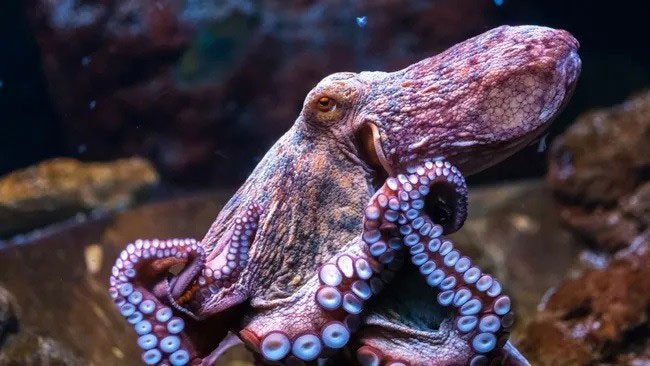Scientists have discovered the oldest known sex chromosomes in octopuses and squids, dating back 455 million to 248 million years ago—180 million years earlier than the previous record.
Ancient chromosomes found in octopuses and squids suggest they may be among the first animals to determine sex through genetic design rather than environmental signals.

Octopuses appear to have evolved sex chromosomes at least 248 million years ago. (Photo: Olga Visavi / Shutterstock).
Sex chromosomes are standard in mammals. In humans, the sex chromosomes are X and Y. Males typically have one X and one Y chromosome, while females have two X chromosomes, although there are some variations, such as XXX or XXY, which can lead to various effects without significant consequences.
For a long time, researchers were uncertain whether mollusks, including squids and octopuses, determined their sex through chromosomes. Mollusks have various reproductive strategies, including hermaphroditism or sequential hermaphroditism, where individuals can change sex over time.
Octopuses have a single sex, but it remains unclear whether genes or environmental signals determine that sex. In some reptiles and fish, factors like temperature can dictate the sex of offspring.
In 2015, researchers completed the first full gene sequence of a cephalopod species, the California two-spot octopus (Octopus bimaculoides). However, this evidence required further validation, leading a team led by Andrew Kern, a biologist at the University of Oregon, to begin filling in the gaps using high-precision methods.
They quickly noticed that one chromosome, chromosome 17, appeared to contain fewer genes than other chromosomes in their sequence. Since they had decoded the sequence of a female octopus, they compared their results with a previously sequenced male individual. In the case of the male, chromosome 17 did not appear less robust than the other chromosomes in the octopus.
This was a clue that chromosome 17 might be related to sex differences. To confirm, the research team sequenced an additional four octopuses, two males and two females, and confirmed that females only had one copy of chromosome 17, while males had two. Therefore, the sex chromosomes of octopuses are not XY and XX as in humans, but rather ZZ and Z0.
The researchers wrote: “This is an incredible time for a sex chromosome to be preserved.”
Before this study, the oldest confirmed sex chromosomes were in sturgeons, according to Nature News, at approximately 180 million years old.





















































